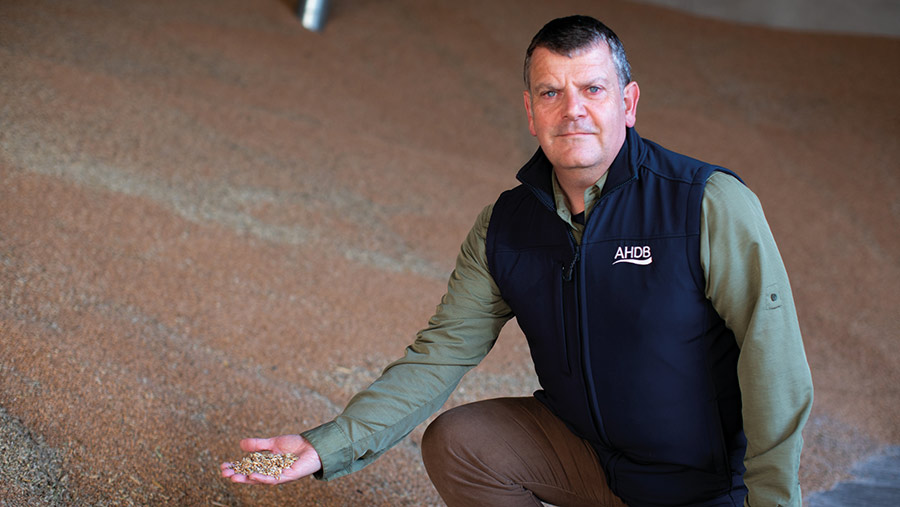Q&A: AHDB chief on the changes to levy body’s activities
 Tim Rycroft © AHDB
Tim Rycroft © AHDB Changes to the way the AHDB operates and spends levy payers’ money are being announced today (Thursday, 10 November).
The four sector councils (Beef & Lamb, Cereals & Oilseeds, Dairy and Pork) will publish their new five-year plans.
The findings are being presented to stakeholders in a major “Delivering the Future of Farming” online event.
Ahead of the meeting, AHDB chief executive Tim Rycroft answered questions from Farmers Weekly News Editor Philip Clarke.
See also: Meat and dairy reputation is AHDB levy payers’ top priority
How is AHDB changing as a result of the review process. What will you be doing differently?
The main change is to reflect levy payer sentiment better and link it to the work that we do. Having a tighter focus is an important part of this.
In the past we were a bit too keen to take on new work, when people told us there were things we should do. They may not have been bad ideas, but collectively we ended up diluting our impact.
We want to focus on the things that only AHDB can do well, because of the way we are funded, the fact we’re commercially and politically independent, and given our scale and expertise.
We acknowledge that there are lots of organisations out there – some commercial, some academic – and it’s very important that we don’t overlap.
Obviously each sector is different, but what will you be doing more of and what will you be doing less of?
There is a big theme in the livestock sector around reputation, and they want us to be doing more to promote exports, marketing and consumer education.
We’ve looked at the work we do on animal health and welfare and will focus on work that is actually supporting reputation, such as the e-medicines book in the pig sector.
But we’re proposing to stop work on things such as the pig health scheme, which does not make the same kind of contribution.
On the cereals side, the focus is much more pre-farmgate. Levy payers want us to do some things better, such as on the recommended list, which we haven’t invested in enough and we will be improving.
An example of what we’ll do less of is in what we call “people in agriculture”, which scored relatively low across all the sectors.
With the arrival of groups like The Institute of Agriculture and Horticulture (TIAH), it’s important we are not doing things they can do better.
The reports show that rampant inflation and static levies have led to a 38% drop in spending power over 10 years. Will levies rise?
Ultimately it is for sector councils to decide if, when and by how much, but we could not even contemplate a levy increase until we had given levy payers a dominant say in the work we do.
Now we have our sector plans, that at least opens up the opportunity for a conversation.
That will start in the next few months, but in the end the decision rests with Defra ministers.
So ministers still have the final say. As a different, more focused outfit, can you change that relationship with government?
There is a conundrum. Levy payers see the money they contribute as their money, but government says it is collected under statute so it is treated as public money, so we are regulated.
That will always generate some creative tension around how much freedom we have to act and to what extent we are accountable to government.
But we are always looking for ways to increase productivity and efficiency in the industry, so the board is keen to make sure that we are not hamstrung by governance and regulation.
There are discussions all the time, but I don’t think there is going to be any major change in the near future.
The new sector plans are for five years, but is there flexibility to change direction more quickly?
Absolutely. You only have to look at the pork sector to understand the speed with which things change. All the sector councils will have the ability to flex things.
We’re obliged to have a proper consultative vote every five years, but that’s a minimum requirement.
There have been considerable job losses already at AHDB. Are there more cuts to come?
The programme of change hasn’t been completed yet and we have yet to finalise budgets.
We’re still doing extension of authorisation for minor usage work in horticulture, and we’ve still got to dispose of some assets such as Sutton Bridge, which will have a huge impact on year-end funds.
We’re continuing to put pressure on our central costs, and we are close to agreeing a move to a smaller building not far from Stoneleigh, which will generate a significant saving for levy payers.
